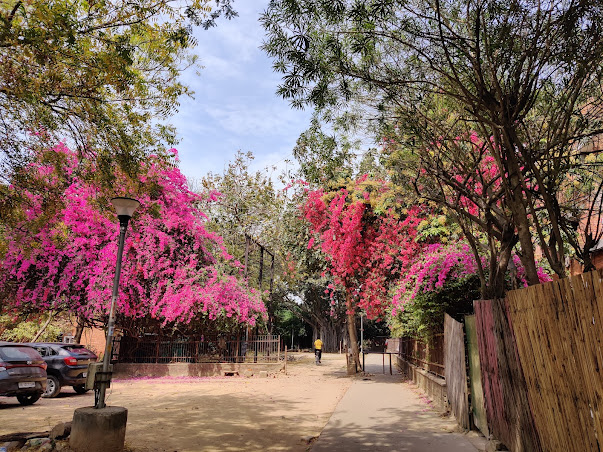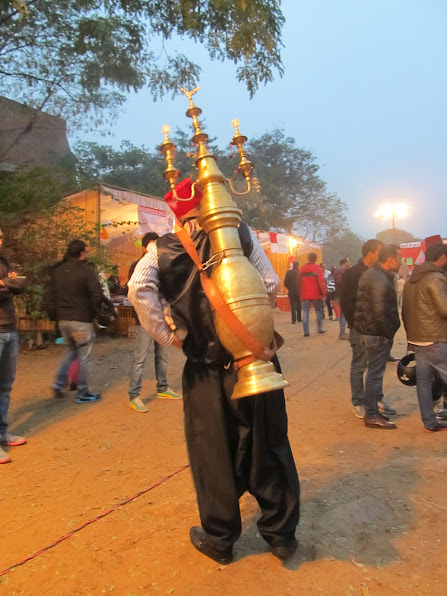Five Things to Do on Arriving the JNU Campus
Jawaharlal Nehru University (JNU) located in New Delhi is renowned for its academic excellence. The University Grants Commission (UGC) has accorded the status of 'University of Excellence' to this central university which was established on 22 April 1969 by Indian Parliament after the JNU Act was enforced and it is named after the first Prime Minister of India, Pandit Jawaharlal Nehru. It comprises of about 1000 acres of land. However, not many people are aware of how vibrant the campus is. Here are the five things that a visitor to the university can explore.
1. Nature
Locating a livable area that is yet enamored with lush vegetation and colorful flora and animals is a genuine blessing in the midst of the concrete jungle that is New Delhi. Expect to see nilgais (blue bulls), the largest Asian antelope, lounging under trees or strolling as soon as you reach the campus.
Here, peafowls can also be seen in good numbers.
You might be fortunate enough to come upon a jackal, hare, or porcupine. You will undoubtedly come across stray dogs and cats in and around the hostels, dhabas, and canteens. A wide range of species, including woodpeckers, rose-ringed parakeets, hornbills, civets, and yellow-footed green pigeons, call the campus home.
JNU is also blessed with a rich diversity of trees along with a variety of birds and animals. During the springtime, the campus looks colourful as long-lasting flowers like bougainvillea, golden shower (the official state flower of Kerala), etc. blossom.
Walk or ride around the JNU ring road early morning or during the sunset to admire the captivating sight of flowers in blooms and the birds chirping or roosting.
2. Handmade Posters
Another thing that you notice is a plethora of handmade posters as you approach the buildings such as the Central Library which is a nine-storey structure, and various different schools which offer academic programmes and promote research, and the canteens. The posters are prepared by different political parties of the university.
3. Dr. B. R. Ambedkar Central Library
The Central Library of JNU is a tall multi-storied building and it is a storehouse of books, documents and periodicals of immense importance. The entry to it is limited to the students and researchers, the faculty members and the staff of JNU. Postgraduate students and researchers of other universities can use the library by showing an Identity Card as well as a Reference letter from his or her supervisor. As a visitor coming to the campus, you can surely get an exterior view of the library.
4. Dhabas and India Coffee House
Dhabas and canteens of various academic schools offer good satisfying meals and snacks at a reasonable price. Idli, dosa, sambhar vada, samosa chaat, chicken curry, fish curry, sweets, chips and a range of other dishes that you can order and enjoy.
The campus also has India Coffee House, a chain restaurant in India, run by the Indian Coffee Workers Cooperative Society.
Indira Gandhi, the daughter of Jawaharlal Nehru was fond of the India Coffee House which is situated on the Baba Kharak Singh Road in New Delhi and her breakfast sometimes included dishes brought from the establishment. This particular coffee house in the past had been visited by a number of prominent politicians viz. Jawaharlal Nehru, V. P. Singh, I. K. Gujral, and Chandrashekhar. The Coffee House was one of the prominent addas or hotbeds for people to get together, drink cups of filter coffee and discuss political issues. Its first outlet was established during the British colonial era in Churchgate, South Bombay (SOBO) in the year 1936, commissioned by the Indian Coffee Board.
5. Cultural Events
JNU actively engages its students in various cultural activities and imparts knowledge about diverse cultural practices and belief systems not just in India but around the world. Its annual International Food Festival provides a glimpse of food culture of different nations. The international students studying in the university set up food stalls.
In order to introduce international language learners to the real taste of the cuisine of the nation whose native language they are striving to study, embassies in New Delhi in collaboration with the School of Language, Literature and Culture Studies (SLLCS) also host food festivals on campus. These kinds of festivals are available to everyone who enjoys cuisine, not just language learners.
There are also hostel food nights in some hostels such as Ganga Hostel which are arranged by the residents of a hostel. They prepare meals from various different states of India. Besides, there are food festivals and cultural events arranged by various communities on their festivals, their respective state-foundation days, etc.
Similarly, JNU also invites prominent theatre training institutions like the National School of Drama (NSD) and others to perform thought-provoking plays.
JNU also hosts public street plays that are open to the public. In order to emphasize the significance and respect the diversity of cultural traditions, many artists from India and other countries are invited.
By exposing its students to such rich cultural heritage not just in their own nation but also from various different parts of the world, JNU aids its students to expand their horizon, their world view and develop as a human being. However, the campus welcomes people from different walks of life too to come and experience the world of diverseness and inclusiveness and gain a greater appreciation for them. Lastly, I want to conclude by quoting Jawaharlal Nehru,
A University stands for humanism. For tolerance, for reason, for the adventure of ideas and for the search of truth. It stands for the onward march of the human race towards ever higher objectives. If the Universities discharge their duties adequately, then it is well with the Nation and the People.

























.jpg)
.JPG)

.JPG)

.JPG)
.jpg)

Comments
Post a Comment